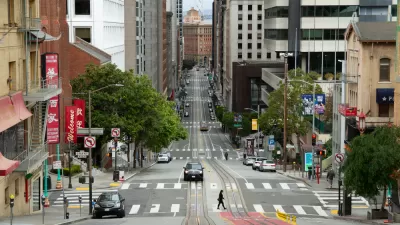As the debate about whether people prefer to live in the suburbs or the big city rages on, data from the U.S. Census reveals a clear preference on the part of economic trends in the wake of the Great Recession.

"Americans in small towns and rural communities are dramatically less likely to start new businesses than they have been in the past," reports Jim Tankersley, who also adds that such an unprecedented trend "jeopardizes the economic future of vast swaths of the country."
The data inspiring the article comes from a new analysis of Census Bureau data by the Economic Innovation Group. The data reveals a complicated narrative for the economic recovery following the Great Recession. Namely: "[what] growth has occurred has been largely confined to a handful of large and innovative areas," like the Silicon Valley, New York City, and parts of Texas.
As for the causes of the consolidation of economic growth, the report identifies a few concurrent trends that have all harmed small businesses in rural America. "Those include the rise of big-box retailers such as Walmart, the loss of millions of manufacturing and construction jobs across the country and a pullback in business lending that appears to have stung small-town and rural borrowers particularly hard," according to Tankersley.
The article includes more details of the data found in the report, as well as data from additional sources on the issue of economic growth. The Washington Post also produced an "explainer" video to help make sense of the jobs report, which can be found below.
FULL STORY: A very bad sign for all but America’s biggest cities

Maui's Vacation Rental Debate Turns Ugly
Verbal attacks, misinformation campaigns and fistfights plague a high-stakes debate to convert thousands of vacation rentals into long-term housing.

Planetizen Federal Action Tracker
A weekly monitor of how Trump’s orders and actions are impacting planners and planning in America.

In Urban Planning, AI Prompting Could be the New Design Thinking
Creativity has long been key to great urban design. What if we see AI as our new creative partner?

Florida Seniors Face Rising Homelessness Risk
High housing costs are pushing more seniors, many of them on a fixed income, into homelessness.

Massachusetts Budget Helps Close MBTA Budget Gap
The budget signed by Gov. Maura Healey includes $470 million in MBTA funding for the next fiscal year.

Milwaukee Launches Vision Zero Plan
Seven years after the city signed its Complete Streets Policy, the city is doubling down on its efforts to eliminate traffic deaths.
Urban Design for Planners 1: Software Tools
This six-course series explores essential urban design concepts using open source software and equips planners with the tools they need to participate fully in the urban design process.
Planning for Universal Design
Learn the tools for implementing Universal Design in planning regulations.
Gallatin County Department of Planning & Community Development
Heyer Gruel & Associates PA
JM Goldson LLC
City of Camden Redevelopment Agency
City of Astoria
Transportation Research & Education Center (TREC) at Portland State University
Jefferson Parish Government
Camden Redevelopment Agency
City of Claremont





























